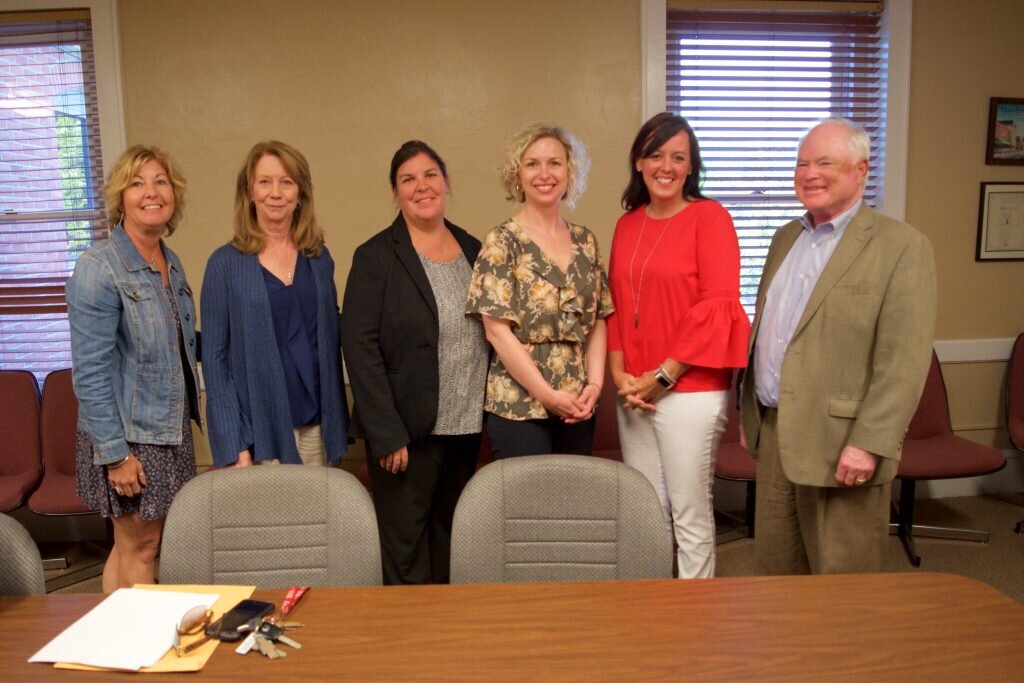
JOSH DAVIS/BAYSIDE GAZETTE
Hope4Recovery board members celebrate last Wednesday after learning their proposed recovery house in Berlin would not have to go through the board of zoning appeals. Plans are now moving forward for the only center of its kind in Worcester County.
By Josh Davis, Associate Editor
(June 14, 2018) While a full house turned out last Wednesday for a Berlin Board of Zoning Appeals hearing about a proposed Hope4Recovery house in the town, the audience didn’t have to stay long.
According to Board Chairman Joe Moore, an attorney, the hearing was not necessary, as the nonprofit recovery home proposed for 10226 Old Ocean City Boulevard meets the requirement of the B-1 District in which it resides.
The conditional-use request was to operate “a group home providing individuals with substance-related or addictive disorders within the B-1 Town Center District,” Moore said.
According to Moore, Planning Director Dave Engelhart last Tuesday received a letter from attorney Hugh Cropper, representing Hope4Recovery, stating his opinion on the use within current code.
In a game of musical attorneys, Town Attorney David Gaskill then responded to Cropper.
Gaskill, present last Wednesday, said Sec. 108-435 (10) of town code, on the B-1 Town Center District, includes boarding houses in its list of permitted uses.
“A boarding house is defined by our zoning code … as a dwelling containing not more than six guest rooms where lodging is provided with or without meals for compensation, for persons not transient,” Gaskill said. “Due to the fact that the proposed Hope4Recovery house will have six or less bedrooms, will provide lodging for compensation, and is an extended-stay facility – which is not for transients – it is my opinion that it’s fairly debatable that the proposed house meets the definition of a boarding house.
“Therefore, it is my opinion that the proposal is a principal permitted use in the B-1 zone and a hearing on this matter is not necessary,” he added.
Moore noted that, as town attorney, Gaskill was also the attorney for the planning director, who did not object.
“Obviously, we appreciate your help [and] we appreciate the staff’s help,” Cropper said. “We agree with the interpretation, and I guess it would be appropriate for us to withdraw our request for a special exception.”
Moore apologized for the lack of communication with the public, saying the attorney opinions had only been written one day earlier.
He added an appeal to the board could be made under Sec.108-189 of town code “by any person aggrieved by any decision of the administrative officer; or by any officer, department, board or bureau affected by any decision of the planning director. Such appeal will be taken within 20 days after the decision by filing with the planning director and with the board of appeals … a notice of appeal specifying the grounds thereof.”
“We’re not suggesting anything other than because there was not an opportunity for the folks [in attendance to weigh in] … I just thought it was fair that you all be notified of the procedures should anyone desire to do so. There’s not any suggestion whatsoever – it’s simply a statement of the provision of the code,” Moore said.
After the ruling, the majority of attendees spilled into the lobby to congratulate Hope4Recovery board members and, especially, Executive Director Patrice Ottey.
Immediately after the hearing, Ottey said she also had just been made aware the exception was deemed unnecessary. She said Cropper was hired “several weeks ago.”
“I don’t know that it’s hit yet for me,” she said of the apparent approval. “I’m kind of taking it all in.”
In March, Ottey and Hope4Recovery Board members attended a Town Council meeting to introduce themselves and discuss preliminary plans for a recovery house on William Street in the residential district. A hearing was scheduled with the Board of Zoning Appeals, but pulled shortly before it was scheduled to occur.
In an interview in March, board members said they would not pursue developing the William Street home, near Berlin Intermediate School, and would instead regroup and look for another location in town.
Ottey, an Ocean Pines Police officer, founded a similar house, the Douglas K. Hamilton House for Recovery, in the Newton neighborhood of Salisbury last year.
In March, she said the proposed house in Berlin would be an all-male facility and a “level two” accredited dwelling. Level one houses are self-run and level two include a live-in house manager.
She said the average stay is about three months in Salisbury and the facility is often short on space, receiving several applications each day.
Patients who enter the home must abstain from using illegal drugs and alcohol, Ottey said. Random drug screenings are performed three times per week.
Clients must attend Alcoholics Anonymous or Narcotics Anonymous meetings and additional outpatient or intensive outpatient meetings. Employment is also required within the first two weeks.
“We have an open-door policy at the Salisbury house, which we’ll have down here. Any moment of the day, the health department or probation officer or anybody can call and say, ‘I would like to come either verify they live there or see this place,’” Ottey said in March. “[The residents] know the house always needs to be presentable.”
Last Wednesday, she said the home would be identical to the one previously proposed.
“From here, we’ll work with Berlin to open the house,” she said.
“It’s a wonderful day for Worcester County,” board President Sarah Hooper added.
Board Secretary Dr. Robert Hooper said the home would be the first of its kind in Worcester County.
“Our focus will be on looking at people attempting to capture their disease and move forward with their life, and this is the first home in this county that is focused on that,” he said. “It’s rather amazing, but it is and we’re thankful for that.”
